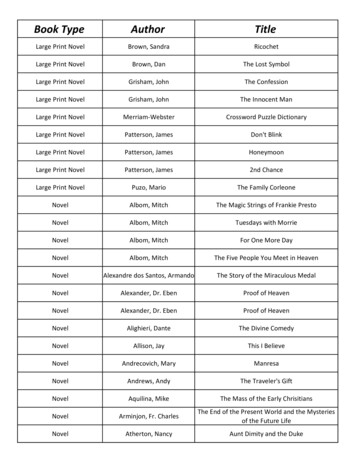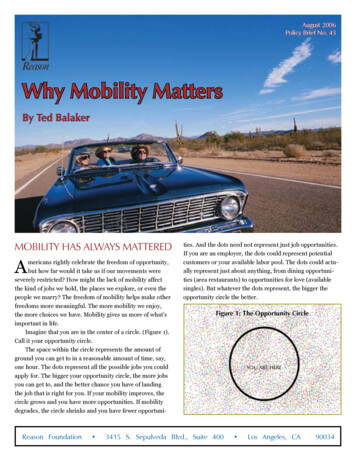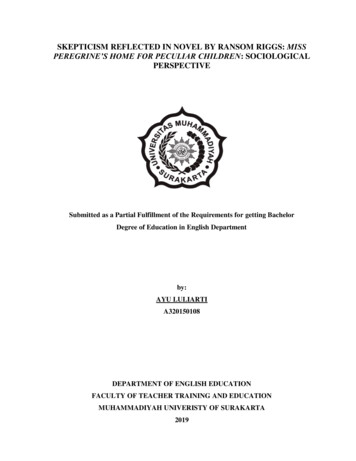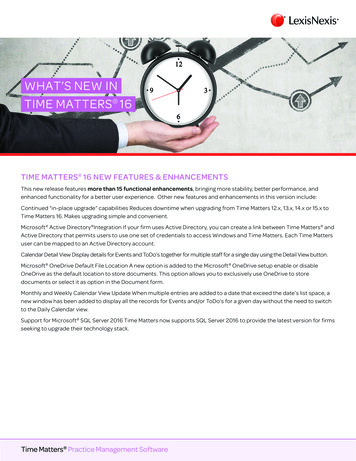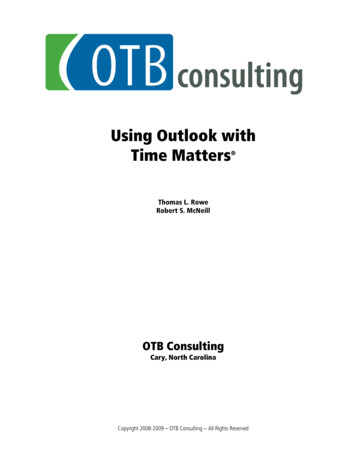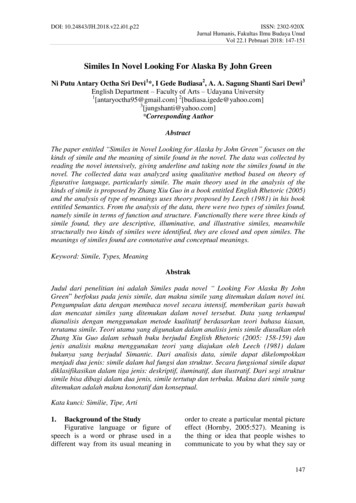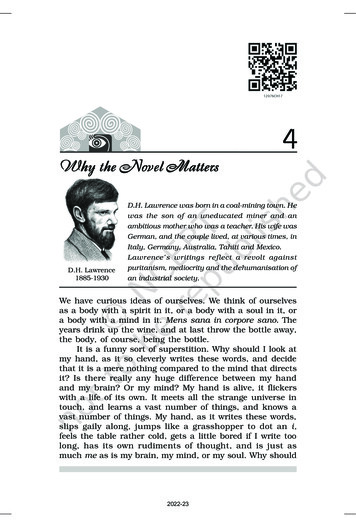
Transcription
165/WHY THE NOVEL MATTERS Why the Novel MattersNovelD.H. Lawrence was born in a coal-mining town. Hewas the son of an uneducated miner and anambitious mother who was a teacher. His wife wasGerman, and the couple lived, at various times, inD.H. Lawrence1885-1930Italy, Germany, Australia, Tahiti and Mexico.Lawrence’s writings reflect a revolt againstpuritanism, mediocrity and the dehumanisation ofan industrial society.We have curious ideas of ourselves. We think of ourselvesas a body with a spirit in it, or a body with a soul in it, ora body with a mind in it. Mens sana in corpore sano. Theyears drink up the wine, and at last throw the bottle away,the body, of course, being the bottle.It is a funny sort of superstition. Why should I look atmy hand, as it so cleverly writes these words, and decidethat it is a mere nothing compared to the mind that directsit? Is there really any huge difference between my handand my brain? Or my mind? My hand is alive, it flickerswith a life of its own. It meets all the strange universe intouch, and learns a vast number of things, and knows avast number of things. My hand, as it writes these words,slips gaily along, jumps like a grasshopper to dot an i,feels the table rather cold, gets a little bored if I write toolong, has its own rudiments of thought, and is just asmuch me as is my brain, my mind, or my soul. Why should2022-23
166/KALEIDOSCOPEI imagine that there is a me which is more me than myhand is? Since my hand is absolutely alive, me alive.Whereas, of course, as far as I am concerned, my penisn’t alive at all. My pen isn’t me alive. Me alive ends at myfingertips.Whatever is me alive is me. Every tiny bit of my handsis alive, every little freckle and hair and fold of skin. Andwhatever is me alive is me. Only my finger-nails, thoseten little weapons between me and an inanimate universe,they cross the mysterious Rubicon between me alive andthings like my pen, which are not alive, in my own sense.So, seeing my hand is all alive and me alive, whereinis it just a bottle, or a jug, or a tin can, or a vessel of clay,or any of the rest of that nonsense? True, if I cut it willbleed, like a can of cherries. But then the skin that is cut,and the veins that bleed, and the bones that should neverbe seen, they are all just as alive as the blood that flows.So the tin can business, or vessel of clay, is just bunk.And that’s what you learn, when you’re a novelist.And that’s what you are very liable not to know, if you’re aparson, or a philosopher, or a scientist, or a stupid person.If you’re a parson, you talk about souls in heaven. If you’rea novelist, you know that paradise is in the palm of yourhand, and on the end of your nose, because both are alive;and alive, and man alive, which is more than you can say,for certain, of paradise. Paradise is after life, and I for oneam not keen on anything that is after life. If you are aphilosopher, you talk about infinity; and the pure spiritwhich knows all things. But if you pick up a novel, yourealise immediately that infinity is just a handle to thisself-same jug of a body of mine; while as for knowing, if Ifind my finger in the fire, I know that fire burns with aknowledge so emphatic and vital, it leaves Nirvana merelya conjecture. Oh, yes, my body, me alive, knows, and knowsintensely. And as for the sum of all knowledge, it can’t beanything more than an accumulation of all the things Iknow in the body, and you, dear reader, know in the body.These damned philosophers, they talk as if theysuddenly went off in steam, and were then much moreimportant than they are when they’re in their shirts. It is2022-23
167/WHY THE NOVEL M ATTERSnonsense. Every man, philosopher included, ends in hisown finger-tips. That’s the end of his man alive. As for thewords and thoughts and sighs and aspirations that flyfrom him, they are so many tremulations in the ether, andnot alive at all. But if the tremulations reach another manalive, he may receive them into his life, and his life maytake on a new colour, like a chameleon creeping from abrown rock on to a green leaf. All very well and good. Itstill doesn’t alter the fact that the so-called spirit, themessage or teaching of the philosopher or the saint, isn’talive at all, but just a tremulation upon the ether, like aradio message. All this spirit stuff is just tremulationsupon the ether. If you, as man alive, quiver from thetremulation of the other into new life, that is because youare man alive, and you take sustenance and stimulationinto your alive man in a myriad ways. But to say that themessage, or the spirit which is communicated to you, ismore important than your living body, is nonsense. Youmight as well say that the potato at dinner was moreimportant.Nothing is important but life. And for myself, I canabsolutely see life nowhere but in the living. Life with acapital L is only man alive. Even a cabbage in the rain iscabbage alive. All things that are alive are amazing. Andall things that are dead are subsidiary to the living. Bettera live dog than a dead lion. But better a live lion than alive dog. C’est la vie!It seems impossible to get a saint, or a philosopher, ora scientist, to stick to this simple truth. They are all, in asense, renegades. The saint wishes to offer himself up asspiritual food for the multitude. Even Frances of Assisiturns himself into a sort of angel-cake, of which anyonemay take a slice. But an angel-cake is rather less thanman alive. And poor St. Francis might well apologise tohis body, when he is dying: ‘Oh, pardon me, my body, thewrong I did you through the years!’ It was no wafer, forothers to eat.The philosopher, on the other hand, because he canthink, decides that nothing but thoughts matter. It is as ifa rabbit, because he can make little pills, should decide2022-23
168/KALEIDOSCOPEthat nothing but little pills matter. As for the scientist, hehas absolutely no use for me so long as I am man alive. Tothe scientist, I am dead. He puts under the microscope abit of dead me, and calls it me. He takes me to pieces, andsays first one piece, and then another piece, is me. Myheart, my liver, my stomach have all been scientificallyme, according to the scientist; and nowadays I am either abrain, or nerves, or glands, or something more up-to-datein the tissue line.Now I absolutely flatly deny that I am a soul, or abody, or a mind, or an intelligence, or a brain, or a nervoussystem, or a bunch of glands, or any of the rest of thesebits of me. The whole is greater than the part. Andtherefore, I, who am man alive, am greater than my soul,or spirit, or body, or mind, or consciousness, or anythingelse that is merely a part of me. I am a man, and alive. Iam man alive, and as long as I can, I intend to go on beingman alive. For this reason I am a novelist. And being a novelist, Iconsider myself superior to the saint, the scientist, thephilosopher, and the poet, who are all great masters ofdifferent bits of man alive, but never get the whole hog.The novel is the one bright book of life. Books are notlife. They are only tremulations on the ether. But the novelas a tremulation can make the whole man alive tremble.Which is more than poetry, philosophy, science, or anyother book tremulation can do.The novel is the book of life. In this sense, the Bible isa great novel. You may say, it is about God. But it is reallyabout man alive.I do hope you begin to get my idea, why the novel issupremely important, as a tremulation on the ether. Plato2022-23
169/WHY THE NOVEL M ATTERSmakes the perfect ideal being tremble in me. But that’sonly a bit of me. Perfection is only a bit, in the strangemake-up of man alive. The Sermon on the Mount makesthe selfless spirit of me quiver. But that, too, is only a bitof me. The Ten Commandments set the old Adam shiveringin me, warning me that I am a thief and a murderer, unlessI watch it. But even the old Adam is only a bit of me.I very much like all these bits of me to be set tremblingwith life and the wisdom of life. But I do ask that thewhole of me shall tremble in its wholeness, some time orother.And this, of course, must happen in me, living.But as far as it can happen from a communication, itcan only happen when a whole novel communicates itselfto me. The Bible—but all the Bible—and Homer, andShakespeare: these are the supreme old novels. These areall things to all men. Which means that in their wholenessthey affect the whole man alive, which is the man himself,beyond any part of him. They set the whole tree tremblingwith a new access of life, they do not just stimulate growthin one direction.I don’t want to grow in any one direction any more.And, if I can help it, I don’t want to stimulate anybody elseinto some particular direction. A particular direction endsin a cul-de-sac. We’re in a cul-de-sac at present.I don’t believe in any dazzling revelation, or in anysupreme Word. ‘The grass withereth, the flower fadeth,but the Word of the Lord shall stand for ever.’ That’s thekind of stuff we’ve drugged ourselves with. As a matter offact, the grass withereth, but comes up all the greener forthat reason, after the rains. The flower fadeth, and thereforethe bud opens. But the Word of the Lord, being man-utteredand a mere vibration on the ether, becomes staler andstaler, more and more boring, till at last we turn a deafear and it ceases to exist, far more finally than any witheredgrass. It is grass that renews its youth like the eagle, notany Word.We should ask for no absolutes, or absolute. Once andfor all and for ever, let us have done with the ugly2022-23
170/KALEIDOSCOPEimperialism of any absolute. There is no absolute good,there is nothing absolutely right. All things flow and change,and even change is not absolute. The whole is a strangeassembly of apparently incongruous parts, slipping pastone another.Me, man alive, I am a very curious assembly ofincongruous parts. My yea! of today is oddly different frommy yea! of yesterday. My tears of tomorrow will have nothingto do with my tears of a year ago. If the one I love remainsunchanged and unchanging, I shall cease to love her. It isonly because she changes and startles me into changeand defies my inertia, and is herself staggered in her inertiaby my changing, that I can continue to love her. If shestayed put, I might as well love the pepper-pot.In all this change, I maintain a certain integrity. Butwoe betide me if I try to put my figure on it. If I say ofmyself, I am this, I am that—then, if I stick to it, I turninto a stupid fixed thing like a lamp-post. I shall neverknow wherein lies my integrity, my individuality, my me. Ican never know it. It is useless to talk about my ego. Thatonly means that I have made up an idea of myself, andthat I am trying to cut myself out to pattern. Which is nogood. You can cut your cloth to fit your coat, but you can’tclip bits off your living body, to trim it down to your idea.True, you can put yourself into ideal corsets. But even inideal corsets, fashions change.Let us learn from the novel. In the novel, the characterscan do nothing but live. If they keep on being good, accordingto pattern, or bad, according to pattern, or even volatile,according to pattern, they cease to live, and the novel fallsdead. A character in a novel has got to live, or it is nothing.We, likewise, in life have got to live, or we are nothing.What we mean by living is, of course, just asindescribable as what we mean by being. Men get ideasinto their heads, of what they mean by Life, and theyproceed to cut life out to pattern. Sometimes they go intothe desert to seek God, sometimes they go into the desertto seek cash, sometimes it is wine, woman, and song, andagain it is water, political reform, and votes. You never2022-23
171/WHY THE NOVEL M ATTERSknow what it will be next: from killing your neighbour withhideous bombs and gas that tears the lungs, to supportinga Foundlings Home and preaching infinite Love, and beingco-respondent in a divorce.In all this wild welter, we need some sort of guide. It’sno good inventing Thou Shalt Nots!What then? Turn truly, honourably to the novel, andsee wherein you are man alive, and wherein you are deadman in life. You may eat your dinner as man alive, or asmere masticating corpse. As man alive you may have ashot at your enemy. But as a ghastly simulacrum of lifeyou may be firing bombs into men who are neither yourenemies nor your friends, but just things you are dead to.Which is criminal, when the things happen to be alive.To be alive, to be man alive, to be whole man alive:that is the point. And at its best, the novel, and the novelsupremely, can help you. It can help you not to be deadman in life. So much of a man walks about dead and acarcass in the street and house, today: so much of womenis merely dead. Like a pianoforte with half the notes mute. But in the novel you can see, plainly, when the mangoes dead, the woman goes inert. You can develop aninstinct for life, if you will, instead of a theory of right andwrong, good and bad.In life, there is right and wrong, good and bad, all thetime. But what is right in one case is wrong in another. Andin the novel you see one man becoming a corpse, because ofhis so-called goodness; another going dead because of hisso-called wickedness. Right and wrong is an instinct: butan instinct of the whole consciousness in a man, bodily,mental, spiritual at once. And only in the novel are all thingsgiven full play, or at least, they may be given full play, whenwe realise that life itself, and not inert safety, is the reasonfor living. For out of the full play of all things emerges the2022-23
172/KALEIDOSCOPEonly thing that is anything, the wholeness of a man, thewholeness of a woman, man alive, and live woman. 1.How does the novel reflect the wholeness of a human being?2.Why does the author consider the novel superior to philosophy,science or even poetry?3.What does the author mean by ‘tremulations on ether’ and‘the novel as a tremulation’?4.What are the arguments presented in the essay against thedenial of the body by spiritual thinkers? Discuss in pairs1.The interest in a novel springs from the reactions of charactersto circumstances. It is more important for characters to betrue to themselves (integrity) than to what is expected of them(consistency). (A foolish consistency is the hobgoblin of littleminds—Emerson.)2.‘The novel is the one bright book of life’. ‘Books are not life’.Discuss the distinction between the two statements. RecallRuskin’s definition of ‘What is a Good Book?’ in Woven WordsClass XI. 1.Certain catch phrases are recurrently used as pegs to hangthe author’s thoughts throughout the essay. List these anddiscuss how they serve to achieve the argumentative force ofthe essay.2.The language of argument is intense and succeeds inconvincing the reader through rhetorical devices. Identify thedevices used by the author to achieve this force. A.Vocabulary1.There are a few non-English expressions in the essay. Identifythem and mention the language they belong to. Can you guessthe meaning of the expressions from the context?2022-23
173/WHY THE NOVEL M ATTERS2.Given below are a few roots from Latin. Make a list of the wordsthat can be derived from themmens (mind)B.corpus(body)sanare (to heal)Grammar: Some Verb ClassesA sentence consists of a noun phrase and a verb phrase. Theverb phrase is built around a verb. There are different kinds ofverbs. Some take only a subject. They are intransitive verbs.Look at these examples from the text in this unit(1a) The grass withers.(1b) The chameleon creeps from a brown rock on to a greenleaf.Notice that an intransitive verb can be followed by prepositionalphrases that have an adverbial function, as in (1b). Suchphrases that follow an intransitive verb are called itscomplements.A kind of intransitive verb that links its subject to a complementis called a ‘linking verb’ or a copula. The most common copulasin English are be, become and seem.The copula be occurs very often in the text in this unit. Itscomplement may be a noun phrase or an adjective phrase.Here are a few examples My hand is alive.(be adjective) The novel is supremely important. (be adjective phrase) You’re a novelist.(be noun phrase) The novel is the book of life.(be noun phrase)Other examples of copulas from the text are given below It seems important. The Word becomes more and more boring.Can you say what the category of the complement is, in theexamples above?TASK1.Identify the intransitive verbs and the copulas in the examplesbelow, from the text in this unit. Say what the category of thecomplement is. You can work in pairs or groups and discussthe reasons for your analysis. I am a thief and a murderer.Right and wrong is an instinct.2022-23
174/KALEIDOSCOPE The flower fades.I am a very curious assembly of incongruous parts.The bud opens.The Word shall stand forever.It is a funny sort of superstition.You’re a philosopher.Nothing is important.The whole is greater than the part.I am a man, and alive.I am greater than anything that is merely a part of me.The novel is the book of life.2.Identify other sentences from the text with intransitive verbsand copulas.C.Spelling and PronunciationLet us look at the following letter combinations and the soundsthey represent chghch is used for the sounds /k/ as in ‘character’, / / as in ‘chart’,or/ / as in ‘champagne’.Word initial rismachoruscharchasechinchalkchore/churchCh/ le ‘ch’ is pronounced / / in most words, it is pronounced/k/ in many others. Generally words with Latin or Greekorigins are pr onounced/k/. Wor ds of French origin arepronounced / /. Words beginning with ‘ch’, followed by aconsonant, are always pronounced /k/, for example chlorine,chrysanthemum, Christian, etc.2022-23
175/WHY THE NOVEL M ATTERSWord medial position/k/ archive/ / mischief/ / chuteMichiganscheduleWord final position/k//Hi-techBachloch (lake)catchspinachpreachstitchmarch// /cachepapier machenichepastichepanache‘Ch’ is not pronounced in ‘schism’ but pronounced as /k/ in‘schizophrenia’. gh is pronounced /g/ as well as /f/ andsometimes not pronounced at all. In the initial position it isalways pronounced /g/. In the medial and final positions itmay be /f/ or silent./g/ ghost/f/ ettotoughboroughghatdraughtdroughtgheesloughLook for other words with ‘ch’, ‘gh’ letter combinations andguess how they are pronounced. ‘Two Blue Birds’ by D.H. LawrenceRhetoric as Idea by D.H. Lawrence.2022-23
The novel is the one bright book of life. Books are not life. They are only tremulations on the ether. But the novel as a tremulation can make the whole man alive tremble. Which is more than poetry, philosophy, science, or any other book tremulation can do. The novel is the book of life. In this sense, the Bible is a great novel. You may say .
